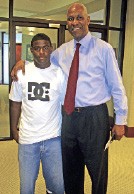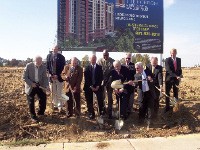The press had it all wrong. So did the pollsters. I said all along it was mathematically impossible for either Chumney or Morris to beat me.”
That was Mayor Willie Herenton on Monday afternoon, holding court in his outer office and still basking in a fifth-term victory that was all the sweeter because it exceeded expectations. Everybody else’s expectations, that is. “I knew I won early voting,” Herenton said.
And he had another theory about the mayoral voting that ended with him on top with 70,177 votes, some 13,000 more than his closest competitor, Councilwoman Carol Chumney. The mayor thought that too much analysis had been wasted on the battle for white votes between Chumney and third-place finisher, former Memphis Light, Gas & Water head Herman Morris. Pundits and reporters alike had neglected to factor him into that contest-within-a-contest, Herenton insisted.
Yes, on election night Herenton had inveighed against “haters” in a euphemistic way reminiscent of former congressman Harold Ford Sr.’s condemnation of “East Memphis devils” from his own post-election platform in 1994.
To be sure, whites had been virtually absent from Herenton’s victory celebration at the Cook Convention Center, and no one was likely to forget the mayor’s frequent campaign references to conspiratorial “snakes” and past trickery by the white power-establishment, nor his persistent declarations that the 2007 mayoral contest was about “race and power.”
Yet, he was now willing to insist that he had been a serious contender for the white vote all along. Nay, more — that his success with white voters is what made the difference in this year’s race.
“I’ve been analyzing the returns,” the mayor said, “and I don’t think I got 70,000 African-American votes. I think 10,000 whites voted for me.”
If that was true, and had the lion’s share of those 10,000 votes gone instead for Chumney, she might indeed have won — an argument that might fuel a conspiracy theory about managed polls that the runner-ups’ camp seems to be taking seriously. (See this week’s Viewpoint)
Herenton himself has an eye for conspiracy. He sees the aborted visit by Ford Sr. to a climactic Herenton rally — one that ended in a widely publicized no-show by the former congressman — in that light. Having missed the rally, Ford might at least have made a public endorsement of his candidacy. “But he couldn’t even do that!” Herenton said.
Noting that longtime adversary Ford had made an early-voting trip into Memphis on the eve of that rally, the mayor said, “I’m convinced he came down here just to cast a vote against me!” And he promised: “I’ll have some things to say about him [Ford] later on.”
The Drug Test Issue
Another sore point with Herenton was Morris’ frequent challenges for the mayor and the rest of the field to join him in taking a drug test. The mayor vanished into his inner office temporarily and returned with several pages showing the results of a test, taken for insurance purposes back in June, that demonstrated negative findings in such categories as HIV, cocaine, alcohol, and tobacco.
He asked me to withhold specific figures, and I will. But it was clear — on this medical accounting, at least — that the mayor had earned a clean bill of health, in every sense of the term. As he said, he looked to be in terrific shape for a 67-year-old man. Even his blood pressure, as he pointed out, was within range. “See?” he said, smiling. “You people in the press can’t even give me high blood pressure!”
The mayor made a special point concerning when the report had been done. “Look at the date: June 26th! That was before [Morris] started that nonsense about drug tests. Some people advised me to show these results, but I had no intention of dignifying him with a response, as if I owed him an answer on something like that!
“Nothing goes in my body stronger than aspirin. Oh, I’ve admitted I like a red wine — a Merlot. But that’s it,” he concluded.
On Fixing the City
 Jackson Baker
Jackson Baker
The newly reelected mayor posed this week with his grandson Adrian Herenton.
By now, Herenton had been joined by former city CAO and current MLGW overseer Rick Masson, who, like his boss, seemed to be floating on the kind of post-election high that needs no drug to activate.
Masson said nothing, but his facial expression alternated between the watchful attentiveness required of any good subordinate and the kind of smirk that ought to be outlawed by the Geneva Convention.
Herenton turned to the issue of his election night remarks, the bitterness of which had been unmistakable. “I’m okay now. I got that out of my system,” he said.
He recalled being at the airport recently when a white man came over — strutting, to hear the mayor tell it:
“He said [Herenton imitating a peremptory voice]: ‘Mayor! When are you going to start trying to fix our city?’
“I looked back at him and said, ‘And when are you going to start helping me?’ He didn’t have anything to say to that.”
The mayor’s message seemed to be that he’s ready to listen whenever his critics want to start talking — so long as it’s a real dialogue.
Winners and Losers: Field Notes From Election Night
From the Victory Podium by Preston Lauterbach
Chez Chumney by Derek Haire
Herman Morris’ Last Dance by Bruce VanWyngarden
 Artist Rendering Courtesy of the Bryan Company
Artist Rendering Courtesy of the Bryan Company 
 Jackson Baker
Jackson Baker